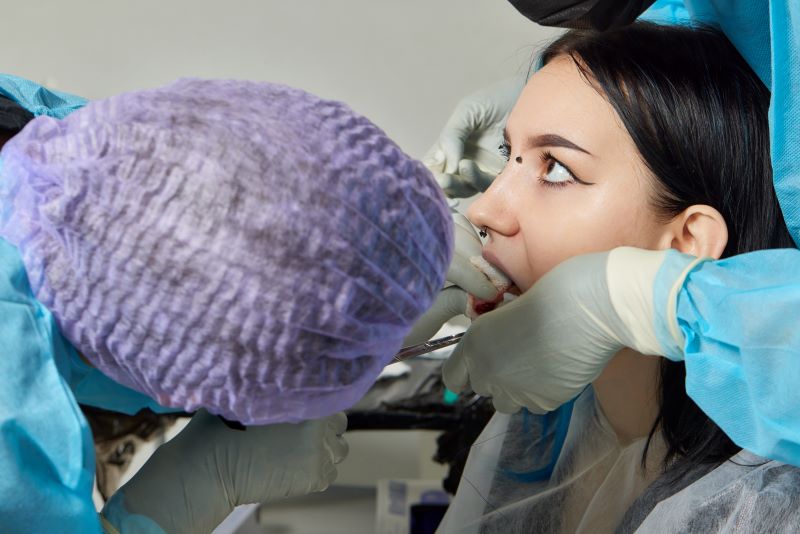

Jaw Cyst, also known as jaw tumors, refers to lesions or swellings that can develop on the jawbone or the soft tissues around the lips. These swellings, which can vary in frequency and size, are generally benign, meaning they are not cancerous. However, they are often observed to grow aggressively. This growth can frequently cause damage to the surrounding bone, tissue, and teeth.
The treatment approach for jaw cysts may vary depending on the shape of the lesions, their rate of growth, and the symptoms they cause in the patient. Surgical intervention on the oral, jaw, or facial area can be used to remove the jaw cyst. Relatively simpler cases may be treated with medications. In some cases, both medication and surgical operations may be applied to the patient.
If left untreated, jaw cysts grow, encircle the jawbone, and can displace surrounding teeth. In advanced cases, tooth loss and permanent damage to the jawbone may also occur.
Since jaw cysts often do not show symptoms, they can be challenging to diagnose. They are typically discovered during routine X-ray examinations taken while undergoing dental treatment for another issue. However, in some cases, they may manifest through symptoms such as swelling, pain in the jawbone, a sensation of numbness, unexplained sensitivity in the teeth, or teeth becoming loose.
Additionally, the presence of ulcers in the mouth, discharge, or abnormally colored areas on the gums may also indicate a jaw cyst.
Benign tumors and cysts can damage the jawbone and surrounding tissue they encase. Therefore, it is essential to proceed with treatment promptly after diagnosis. Whether the jaw tumor is benign or malignant is determined following a biopsy.
Interestingly, jaw cysts can persist in some patients for years without causing any discomfort. However, once they become infected, they can be extremely painful. If left unaddressed, jaw tumor cases that continue to grow, damage nearby teeth, and eventually even cause fractures in the jawbone can severely impact quality of life.
Jaw cysts can be diagnosed through X-ray imaging, and their physical symptoms may include:
At Dentalive, our team of expert dentists has achieved successful results in jaw cyst treatments. You can contact our patient consultation line to schedule an appointment and return to your daily life seamlessly after your jaw cyst operation.
The answer to this question varies depending on the type and size of the tumor. Although jaw tumors are often benign, they are usually removed through surgical intervention. In some advanced cases, jawbone restoration may also be required.
The treatment of malignant and invasive tumors is determined based on the location of the cyst. A treatment plan may involve surgery, chemotherapy, or a combination of both.
The expert dentists at Dentalive will be happy to assist you in determining the most suitable treatment for your condition.
During surgery, the surgeon may need to address the affected teeth, tissue, or jawbone while removing the tumor or cyst from the area. A sample of the removed tissue is sent to the laboratory for biopsy. Based on the findings from the pathologists, the appropriate procedure is determined, and the surgery proceeds accordingly.
Post-surgery, additional treatments may be applied depending on the patient's condition, including:
If a tooth needs to be extracted during the procedure, implant treatment is recommended to prevent potential difficulties in eating, speaking, and swallowing, thereby improving the patient's quality of life.
Cyst, or tumor, is the medical term for overgrown tissues. Jaw cysts may contain semi-solid substances or be entirely filled with fluid.
The most common types of jaw cysts include:
Jaw cysts or jaw tumors, which can develop in the jawbone where teeth are positioned, are categorized into two types: odontogenic and non-odontogenic. As the name suggests, odontogenic tumors are related to tooth formation, while non-odontogenic tumors often originate from bone or soft tissue cells.
Unfortunately, the medical community has not reached a consensus on a definitive cause for the formation of jaw cysts. However, it is known that some types of tumors are associated with genetic mutations and hereditary syndromes.
For example, patients with nevoid basal cell carcinoma syndrome, also known as Gorlin-Goltz syndrome, lack a tumor-suppressing gene, making them more susceptible to jaw cysts. This syndrome, caused by a genetic mutation, is inherited from family members. In addition to odontogenic keratocysts appearing on the jaw, basal cell carcinoma of the skin is also common in these patients.
Since the exact cause is still unknown, experts are unable to provide specific recommendations for preventing jaw cyst formation. However, it is crucial to seek prompt treatment once diagnosed. If you suspect a jaw cyst, you can contact Dentaliva, which offers oral and dental health services with a team of 70 professionals.
After scheduling an appointment, our team of expert dentists will outline the treatment plan tailored to your needs and perform the necessary interventions to restore your healthy smile.